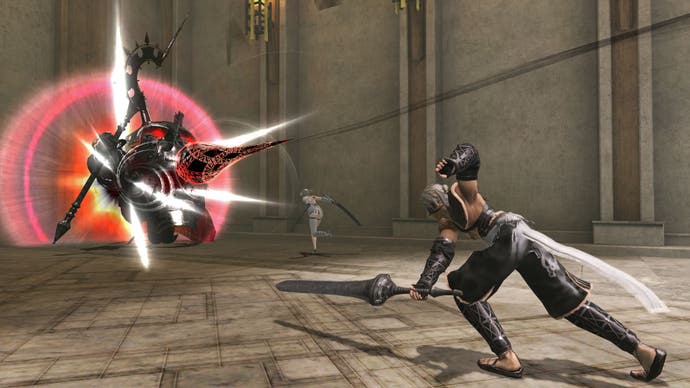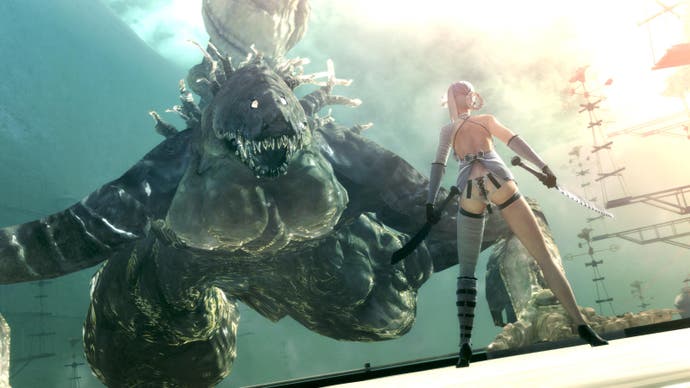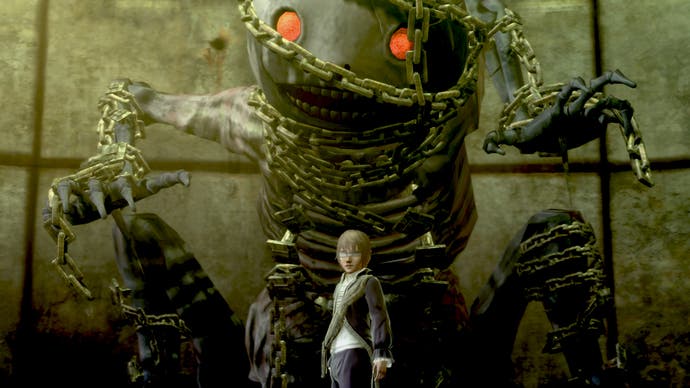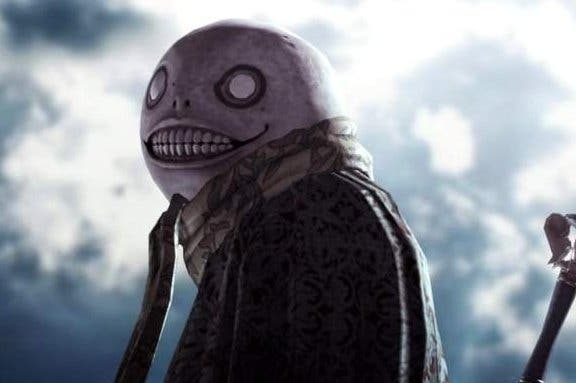Nier is the rare game that gets better with age
Poor sales and tepid reviews couldn't keep this underdog down.
A lot of classics follow the same story: a brilliant artist creates a piece of work, critics don't think much of it, it's a commercial failure, then, many years later, it takes on a cult following. This was the case with Moby Dick. It was the case with Blade Runner. It was the case with Abbey Road. But we don't see this so often in games. If something comes out and gets mediocre reviews then sells poorly, it all but disappears and is relegated to clearance bins, destined to quickly fade from memory. Nier is an exception.
I'll never forget my first time playing Nier. I was reviewing it for another outlet back in my freelance days, and came late to developer Cavia's action RPG, after the first round of reviews had hit. I knew Chris Schilling had given it a 6/10 here at Eurogamer, and I knew its Metacritic score was wavering in the high 60s or low 70s. I was expecting a moderately enjoyable, but ultimately forgettable action-RPG romp that Square Enix had left to die with dated graphics belying its diminutive budget, and a negligible marketing campaign following in the ashes of Final Fantasy 13.
Nier is much more than that, though. It may well be one of my favourite games of the last console generation, and at the time I found myself bewildered and quite frankly unsettled that Nier had come in for such a rough critical ride. Was it the graphics? The somewhat simplistic combat? The ugly main character? I've since made a point to recommend it to my friends - and so strong was my passion for Nier that I inadvertently started a Twitter meme; whenever anyone I followed mentioned Nier, I had to chime in "Did someone say Nier?" I still get tagged in these posts years later by people I don't even know. (I eventually deleted Twitter from my phone partially due to this.)
Five years on and it seems lots of people I know have played Nier, though I don't think it's because of my Twitter campaign. The Nier cult following grew because lots of players stumbled into it by accident. I'm not sure if people picked it up in bargain bins or had a friend recommend it to them (or both); either way, slowly but surely people tried it out years after launch. And while it didn't stick for everyone, those who connected with it really connected with it.

So what makes this oddball game so special? I think it's the sense of wonder, something it achieves in a way so few other games do. Many have sprawling fantasy worlds, but few are courageous enough to be this cryptic.
After an oblique opening of a man protecting his daughter from monsters in the nuclear winter of 2049, we're unceremoniously shuffled 1312 years further into the future for some initially inexplicable reason. From that point on, the mysteries are laid on thick. Where other sci-fi/fantasy RPGs like The Witcher or Fallout flesh out their worlds with endless NPC banter, dialogue in Nier is brief and arcane. It's more akin to the Souls series that way, where most NPCs only deliver a line or two. Perplexingly, it often uses modern lingo. The first words spoken are "Weiss, you dumbass!" Rather than make the world feel undeveloped, it gives it a stranger, more alluring air. You're trying to piece everything together in this bizarro far-flung future fantasy and the lack of exposition lends Nier a surreal, dream-like quality. Its flights of fancy make its otherwordliness explicit: at one point it becomes a text adventure as you wade through the abstractions of other characters' dreams.
Its storytelling remains abstruse throughout. You spend much of the game confused about what's going on, while your mind takes hold on the few concrete details you have. A man is trying to rescue his sick daughter. Some monsters are roaming the land. This is in the future, but what that means isn't clear until the end (and even then there's never quite crystal clarity). Everything else is a series of vignettes in a world that doesn't even attempt to be cohesive. Even the title is a mystery, something that never crops up in the game itself. It's popularly accepted that it's supposed to be the protagonist's name, but you're asked to name the player character yourself with the default being a blank entry. Where most sci-fi fantasy games feel like slaves to their lore, Nier gives the entire concept of world building a big "f*** you" as it endlessly flips through director Yoko Taro's manic mental index of "wouldn't it be cool if?"
It's wild stuff. Just looks at its art direction that avoids the usual medieval fantasy and instead merges such diverse locales as a Santorini-inspired fishing village, a steampunk mine, an elegant mansion and a pueblo-like city whose denizens all wear masks and must follow hundreds of thousands of seemingly arbitrary rules; one of which being that no two homes can be built at the same elevation. Why? Who knows. You just sort of learn to roll with it. I'm reminded of Julie Taymor's take on Titus, which tossed together ancient Greek architecture, 20th century automobiles and 80s goth fashion with reckless abandon.

The mechanics are equally bonkers. At times you're playing a Zelda clone, at others it's a Resident Evil homage (complete with awkward camera angles and stilted movements), and at one point it decides to be a Diablo-esque isometric dungeon crawler for 20 minutes. Nier may not be especially refined at any of these, but it's more than the sum of its parts.
It's not the mechanics that make Nier special; it's the overall mood of the game. Nier isn't just weird; it's melancholy. Almost profoundly so in a way few games - especially Japanese RPGs - dare. People die in Nier rather a lot, and no good deed goes unpunished. An early sidequest asks you to find an old man's missing dog. You find it, but it's dead. When you head back to report the news, you hear the old man has just passed too.
Nier never has anything to do with saving the world. There are monsters, curses, and haunted spirits roaming the land, but the goal isn't to eliminate them. All those hardships folks face is just a way of life. Your goal is much more intimate: save your dying daughter. It's a simple idea, yet seldom few action-RPGs are willing to place such an epic adventure around such an intimate conundrum.
Despite its downbeat premise, Nier is also funny. Only Metal Gear Solid and Deadly Premonition can rival Nier in terms of unpredictable tonal shifts and meta humour. One moment the game treats its heroes plight of caring for his dying daughter with absolute sincerity and the next a talking book teases you for accepting too many sidequests. "Can't these people do anything for themselves?" he chides, just as the player is thinking the same thing.

The characters you meet in Nier are as delightfully imaginative as the rest of the world. Along your quest you'll team up with a cursed child who finds himself deformed into that terrifying skeleton director Taro Yoko cosplayed as at E3 this year. A sweet-natured child is a pretty common trope in fiction, but a sweet-natured child who looks like the spawn of Jack Skellington and Humpty Dumpty? That is pretty novel.
And he's not even the game's most interesting character. That honour would have to go to Kaine, the potty mouthed woman warrior inexplicably prancing about in high heels and lingerie, which seems pretty insulting until you realise she's an intersex person (i.e. born with male and female genitalia). Suddenly her ridiculous getup seems less like a lowbrow marketing ploy (which it probably also is, to be honest) and more like a subversion of cliches while remaining true to a character with a gender identity crisis that could rival Hedwig. (Maybe it's just me, but from her profile I think she resembles John Cameron Mitchell.) These are interesting, original companions. It doesn't take long for players to stop caring about things like plot and lore and get wrapped up in the personal struggles of this ragtag band of misfits.
Nier is the rare game that looked archaic upon release, yet somehow remains fresh half a decade later. It was always more interesting than it was 'good'. It may not actually tell that great a story overall, and it's not an especially refined action-RPG, but what it lacks in polish and production values it makes up for in spirit and imagination. Nier may not be perfect, but it's one-of-a-kind and the world needs more big publisher-backed experiments like it. With the action experts at Platinum lending a hand and Square-Enix offering some of its A-list production talent, the not-quite-sequel recently announced gives me hope that this industry is maturing; that those holding the purse strings are realising we needn't just look to the future, but ought to dig a little deeper into the past as well.









